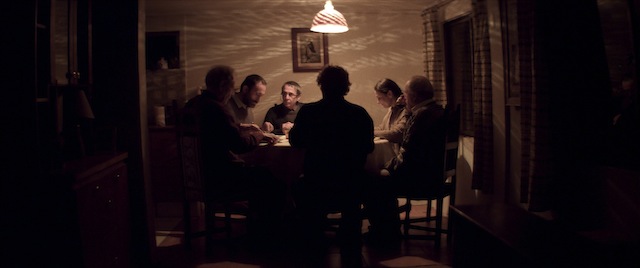‘The Club’ The Catholic Church child abuse scandals are back into the national conversation, and for that we can thank “Spotlight.” But the awards favorite is not really about the scandals; it’s about journalism. The priests and the highers-ups are barely shown, and you get the sense that filmmaker Tom McCarthy would rather, you know, not go there. “The Club” will go there. This Chilean drama, which is partly a somewhat absurdist almost-comedy, opens with a man of the cloth beginning his stint at a home for disgraced priests. Soon as he’s arrived he’s hounded by one of his very troubled former victims. Named Sandokan (Roberto Farias), he shouts graphic descriptions of the atrocities he endured as a child, loud enough for everyone in town to hear. It’s not clear what he wants, and he’s only temporarily satisfied when his former abuser shuffles outside holding a gun and shoots himself in the head. RELATED: Review: “Hail, Caesar!” is the Coens’ deceptively light look at Old Hollywood Pain doesn’t go away, not even the pain that plagues those who’ve heaped pain upon others. The ensemble in “The Club” are all men — and one (wrongfully, she claims) fallen nun (Antonia Zegers) — who’ve committed (or are alleged to have committed) unspeakable crimes. Instead of punishing them and fixing a broken institution, the Church has spirited them away to a quaint, homey house in a remote coastal town. It’s less a prison than a neverending camp for aging men. They share rooms. They’re not allowed near the locals. Some have gotten really into greyhound racing. Their tranquil life is upset by first the inciting incident, then an ominous Vatican official, Father Garcia (Marcelo Alonso), who arrives to either restore order or dissolve the home entirely, scattering its inhabitants to uncertain futures. Or as one of them puts it, “They’re going to screw us.” (Though that could just be the work of a mordant translator manning the subtitles.) We shouldn’t feel for them, but “The Club” is interested in forcing the audience into a more complex, even more useful reaction. We’re supposed to understand without forgiving them their actions, and we’re confronted with people who’ve done horrible things but still have to live the rest of their lives. A good chunk of the film finds Garcia interrogating each one. They’re tete-a-tetes that turn into confessions and sometimes therapy. Most are defensive. Some point out the smug superiority of a priest working for an organization that prefers quickie solutions to correcting deeper issues within. One (Alfredo Castro) even points out that homosexuality is more transcendent than straight sex and oughtn’t be ostracized. “The Club” itself has no straight-forward agenda. It wants to throw bombs, to upset our complacent view of a scandal that has never been properly addressed, even by those outside the Church. Sandokan never goes away, harassing the other ex-priests and skulking about like a booze-soaked, self-destructive Banquo. His language is angry and painfully, stomach-churningly descriptive, not couched in niceties that allow us to put the issue on the back-burner, to be corrected at a later date, when we get around to it. RELATED: Wonderfully stubborn director Michael Mann gets a complete retro at BAM That still makes “The Club” sound more like an issue movie than it is. It’s a political film but also a humanistic one. Director Pablo Larrain has previously made angry and darkly funny films that address Chilean ills more stridently. “Tony Manero” used “Saturday Night Fever,” of all things, to comment on specific class issues in Chile, while “No” showed how even the campaign to oust murderous dictator Augusto Pinochet had to revert to dirty tricks. Being noble does not mean being saintly, and “The Club” continues that idea but in a deceptively gentle fashion. It finds deep empathy for monsters — for men who’ve done unimaginable harm upon others and still have to live the rest of their lives. “The Club” doesn’t have the extreme stylistic tricks of “No,” which was shot entirely on splotchy ’80s video, where real life and campaign commercials looked just about the same. Here he films in hazy modern video and employs the mournful strings of Arvo Part, the overused go-to composer for Serious Filmmaking (albeit a haunting piece, “Fratres,” that’s only semi-frequently used). He lulls us into thinking this is a nice export about an important topic, then broadsides us by offering us a film with no easy answers. We might think it will end with a pat, reassuring conclusion, only for it to remind us that trauma never goes away, much as we try to trick ourselves that it does.
Director: Pablo Larrain
Stars: Alfredo Castro, Marcelo Alonso
Rating: NR
4 (out of 5) Globes
‘The Club’ is an angry, humane look at the Catholic Church abuse scandal

Music Box Films
Follow Matt Prigge on Twitter@mattprigge


















